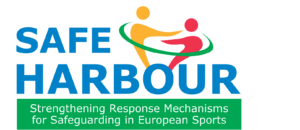Project Overview
The SAFE HARBOUR Project, co-funded by the Erasmus+ Programme of the European Union, officially started its journey in January 2025. Running until June 2027, this initiative brings together 27 organisations, including the International Olympic Committee (IOC), two International Federations (IFs), 20 National Olympic Committees (NOCs), and expert institutions such as Thomas More University and the Asser Institute. As the project coordinator, the EOC EU Office leads collaborative efforts to enhance safeguarding measures across European sport, fostering a safer environment for athletes, coaches, and stakeholders. The project will map existing safeguarding practices, identify service gaps, and develop a European Response Framework to guide safeguarding initiatives continent-wide. Additionally, tailored National Strategies will be created to address country-specific challenges, supported by specialised training programmes to build expertise.
A key milestone will be the establishment of the European Network for Safeguarding in Sport (ENSS), an online platform dedicated to collaboration, knowledge-sharing, and sustaining long-term safeguarding efforts. To broaden its impact, SAFE HARBOUR will also organise National Multiplier Events to engage stakeholders beyond the consortium. By providing concrete tools and support networks, the project aims to empower NOCs and Federations, strengthen Safeguarding Officer networks, and lay the foundation for a future IOC Regional Safeguarding Hub.
Kick-off Meeting
The project’s journey began with a successful Kick-off Meeting held on 28–29 January in Brussels, where partners gathered to align on objectives and initial activities. Day 1 featured presentations on key safeguarding topics, including the history of safeguarding, European and global strategies, prevalence of safeguarding concerns, and existing regulations. Participants also engaged in a Q&A session with a European Commission representative, gaining valuable recommendations for project implementation.
Day 2 focused on interactive sessions, where NOCs and IFs shared best practices and challenges, provided feedback on deliverables in development, and collaborated in group sessions to begin mapping key stakeholders involved in case handling of safeguarding concerns. Technical discussions throughout both days ensured a structured and effective approach to the next phases of the project.
Looking ahead
With the Kick-off Meeting successfully completed, SAFE HARBOUR is now advancing its first major activities. The project will work towards the establishment of the ENSS, the development of National Strategies, and the creation of sustainable safeguarding frameworks to ensure long-term impact.
For more updates, follow the SAFE HARBOUR LinkedIn page, visit the website, and subscribe to the Newsletter.
SAFE HARBOUR project Newsletter


